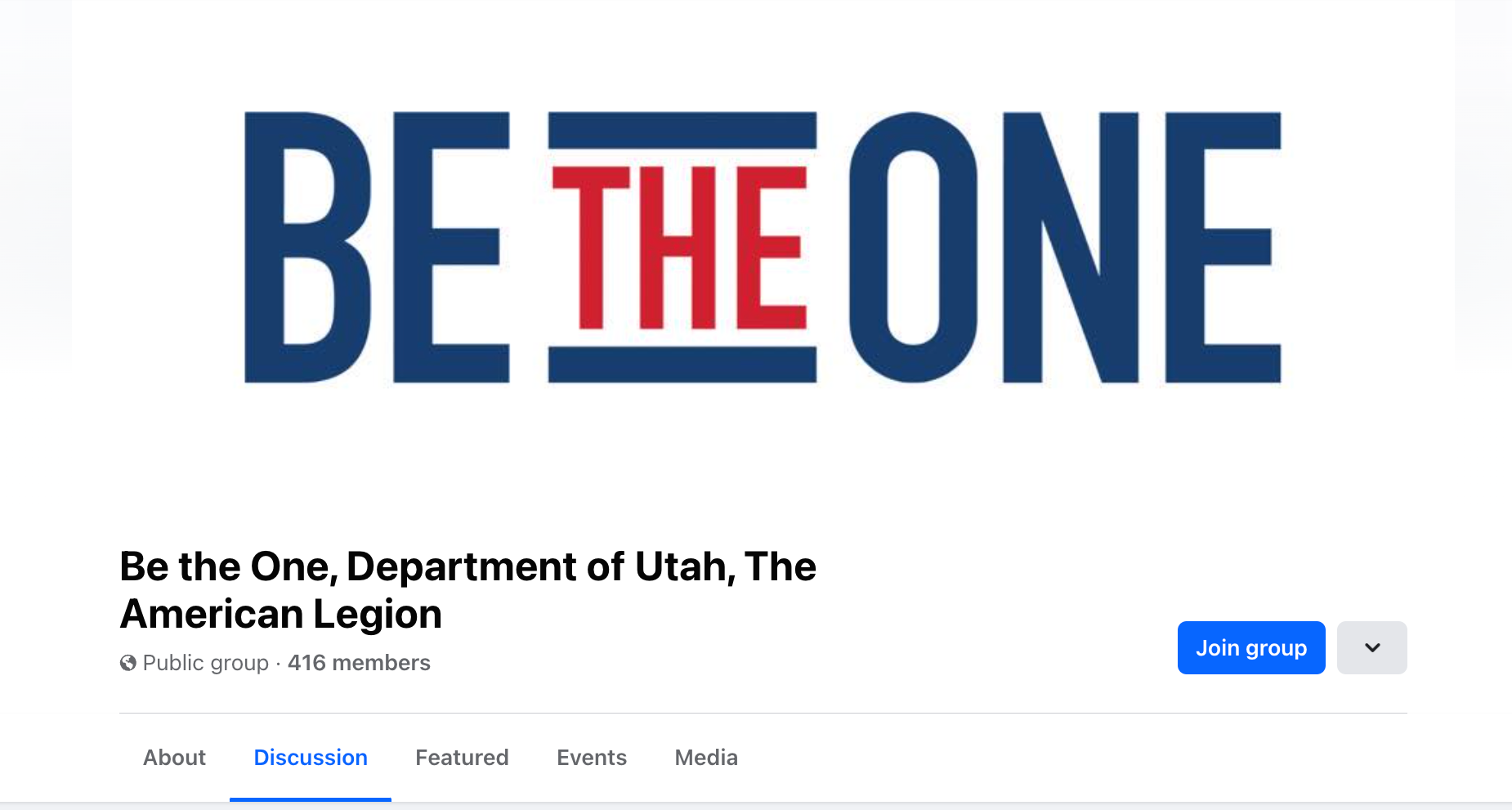
The Department of Utah’s Be the One Facebook group is a place for conversation, communication and support around the Legion’s veteran suicide prevention mission.
The American Legion Department of Utah launched a Be the One Facebook group in 2023 under then-Department Commander Ninzel Rasmuson to educate, engage, and start conversation about the Legion’s top priority – veteran suicide prevention. In less than two years, the group has over 400 followers that include Utah Legion Family and community members, and members from other Legion departments. Visit the Be the One, Department of Utah, The American Legion Facebook group.
“What I wanted to achieve was a community,” Rasmuson said about the group. “And the reason why that was important is because Legionnaires and American Legion Family overall, we're a community and I wanted there to be ongoing conversation that was happening around the Be the One mission for The American Legion. The focus was to get conversation going, develop a better community within our department, and open up better communication. And that's what it's done.”
As admin for the group, Rasmuson helps initiate conversation by:
- asking questions about upcoming Be the One post or district events, suicide prevention training locally or through the Legion’s free virtual training with Columbia University.
- posting The American Legion Tango Alpha Lima Be the One podcast and other podcasts related to suicide prevention.
- discussing state leadership initiatives for suicide prevention, and national suicide prevention reports.
- posting anything related to mental health and well-being that supports Be the One.
She ends each post with hashtag #betheone.
“It’s all geared towards Be the One and the reason why is because it's helping the veteran. It's helping them interact. It's helping them get connected. It's helping them get to the next thing that is going to impact their life for the better and hopefully for the purpose of veteran suicide prevention.”
Rasmuson has seen members of the Be the One Facebook group spread its message with others to create a wider impact. As an example, a Sons of The American Legion member met a woman whose son has experienced suicide ideation. He encouraged her to join the group, even though she is not a Legion Family member. Now, the two are creating a Be the One event in their community.
“Again, this comes back to community,” she said. “The woman just loves what The American Legion is doing and what the Be the One mission is and was so adamant that this needs to change, and ‘I'm going to be a part of it’ and I think that's the success. I think that's the success story part because this community within this Facebook page has opened the doors to an event being done in March because it's part of the community saying enough is enough on suicide.”
Rasmuson provided the following tips to starting a Be the One group on Facebook:
- Assign someone with an interest to be the group administrator. “I happen to have that interest, so it was easy enough for me to do that.”
- Post content that is interesting, personal and relatable to your audience. For example, a community in Utah was hosting a veteran entrepreneur networking event that Rasmuson shared in the Be the One group. “How does that help and connect with Be the One? Well, it connects with Be the One because it's going to help the veteran with networking and social aspects of their life.”
- Be consistent. “In other words, you can’t put a group out there and post once and not come back to it for three weeks.”
- Invite others from outside of your department to join who have an interest in The American Legion and Be the One to get them involved “not just with mental health and well-being, but also activities and events. The things that we want the community to be a part of.”
- Have a theme of what you want to focus on for the week or month.
- Invite Legion Family members to be group moderators. “I think having a moderator to make sure that the content that's going on your page or group is accurate, that it's clean. There are times where if somebody posts something, and it's rare, that's not something that needs to be on this group, then I just delete it. I think it's important to make sure that whatever you're posting that it is accurate.”
- Know your resources. “It’s a place to have real conversation and real-life experiences and if there is somebody that is struggling in their mental health and we find out about it through this group, then we make a referral. So be aware of what resources are available to you locally in your community and state to help that veteran or even community member to get the help that they need. And that's the whole point is building community.”
“With the Facebook group, just listen. What do people need?” Rasmuson added. “This is a hard topic. It’s one that a lot of people are not comfortable talking about. But it’s personal to each of us, right? We've had family and friends and veterans who have died by suicide.
“It’s having a candid conversation and communicating in our community about how we can do better, how we can help each other. I heard this phrase of how we can gaze up and not glance down as much as we do on our phones and other devices. I thought, you know, gaze up and add look around you. Who are the people that are right next to you, and we don't know what they're going through. Don't ask just ‘how are you?’ and not be genuinely interested to hear their answer. Engage.”
- Be the One

